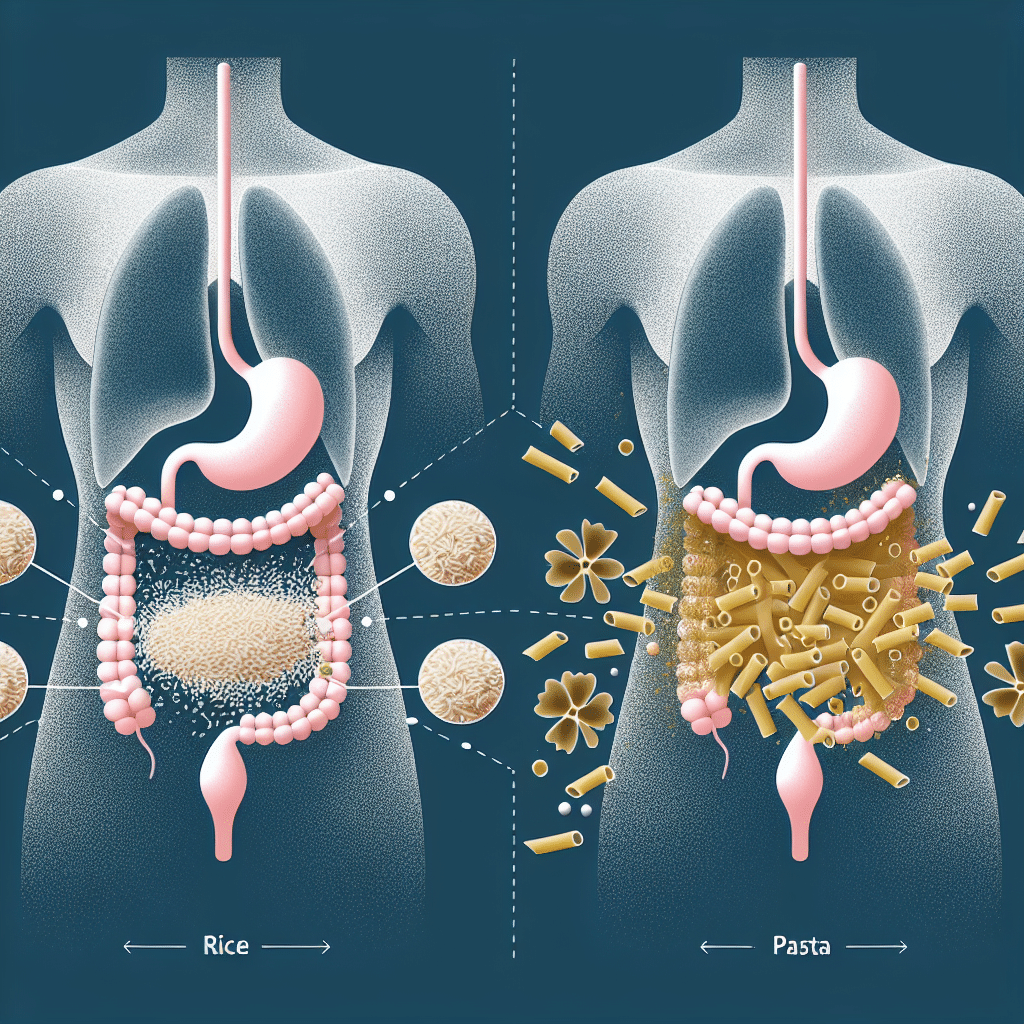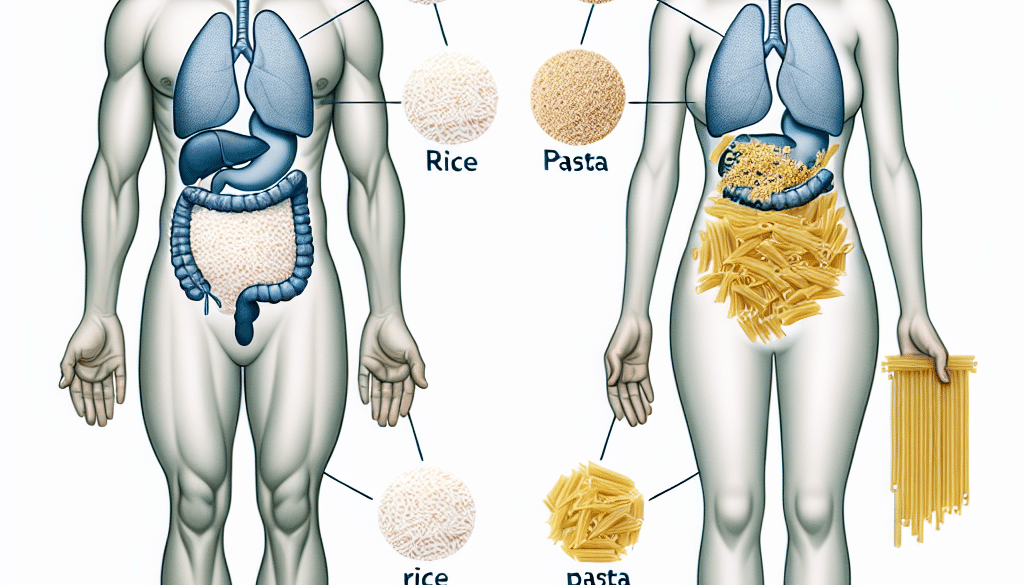Is Rice Easier To Digest Than Pasta?
-
Table of Contents
- Is Rice Easier to Digest Than Pasta? Exploring Digestibility and Health Impacts
- Understanding Digestibility
- Composition of Rice and Pasta
- Impact on Digestion
- Comparing Digestibility: Rice vs. Pasta
- Health Impacts and Considerations
- Case Studies and Research
- Personal Digestive Health
- Conclusion: Balancing Digestibility with Nutritional Needs
- Enhance Your Diet with ETprotein’s High-Quality Protein Products
Is Rice Easier to Digest Than Pasta? Exploring Digestibility and Health Impacts

When it comes to choosing staple foods that are both nutritious and easy on the digestive system, rice and pasta often come to mind. These two carbohydrate-rich foods are integral to various cuisines around the world and are consumed by millions daily. However, the question of whether rice is easier to digest than pasta is a topic of interest for many, especially for those with digestive sensitivities or those looking to optimize their diet for better health. In this article, we will delve into the digestibility of rice versus pasta, examining their composition, the impact on digestion, and what health experts have to say.
Understanding Digestibility
Before comparing rice and pasta, it’s important to understand what we mean by ‘digestibility.’ Digestibility refers to how easily a food can be broken down and absorbed by the digestive system. Factors that influence digestibility include the food’s macronutrient composition, fiber content, and the presence of any anti-nutrients or compounds that can interfere with digestion.
Composition of Rice and Pasta
Rice and pasta are both primarily composed of carbohydrates, but they differ in their types of carbohydrates and other nutritional components.
- Rice: Typically, rice contains starch in the form of amylose and amylopectin, with brown rice also containing dietary fiber, vitamins, and minerals due to its whole grain nature.
- Pasta: Pasta, particularly refined pasta, is made from durum wheat and contains gluten, a protein that can be difficult for some people to digest. Whole grain pasta also includes fiber, vitamins, and minerals.
Impact on Digestion
The digestibility of rice and pasta can vary depending on the individual and the specific type of each food consumed.
- Rice: Generally, rice is considered to be easily digestible, especially white rice, as it has a lower fiber content and is free from gluten.
- Pasta: Pasta may be less digestible for those with gluten sensitivities or celiac disease. However, for individuals without these conditions, pasta can be digested comfortably, especially when it is cooked ‘al dente’ as this preserves more of the starch structure.
Comparing Digestibility: Rice vs. Pasta
When comparing the two, white rice is often regarded as more digestible than pasta due to its simplicity and lack of gluten. However, this does not necessarily mean that pasta is a poor choice. Whole grain pasta can be a good source of fiber and nutrients, and for those without gluten intolerance, it can be part of a healthy diet.
Health Impacts and Considerations
Choosing between rice and pasta may also depend on one’s health goals and dietary needs.
- Glycemic Index: White rice has a higher glycemic index (GI) than most pasta, which means it can cause a quicker spike in blood sugar levels. This is an important consideration for those managing diabetes or looking to maintain stable energy levels.
- Fiber Content: Brown rice and whole grain pasta have higher fiber content compared to their refined counterparts, which can aid in digestion and promote a feeling of fullness.
- Gluten Content: For those with gluten intolerance or celiac disease, rice is the clear choice as it is naturally gluten-free, whereas pasta contains gluten unless specifically labeled as gluten-free.
Case Studies and Research
Several studies have investigated the digestibility of rice and pasta. For instance, research published in the ‘Journal of Agricultural and Food Chemistry’ found that the structure of starch in cooked rice makes it more digestible than pasta. Another study in the ‘American Journal of Clinical Nutrition’ highlighted that the glycemic response to rice and pasta can vary, affecting satiety and subsequent food intake.
Personal Digestive Health
Ultimately, the choice between rice and pasta may come down to personal digestive health and how each individual’s body responds to these foods. It’s important to listen to your body and consider any digestive discomfort after consuming either food.
Conclusion: Balancing Digestibility with Nutritional Needs
In conclusion, while rice is generally considered easier to digest than pasta, particularly for those with gluten sensitivities, both foods can be part of a balanced diet. The key is to choose the right type of rice or pasta based on your health goals and digestive comfort, and to pay attention to portion sizes and cooking methods.
Enhance Your Diet with ETprotein’s High-Quality Protein Products
If you’re looking to supplement your diet with high-quality protein sources, consider ETprotein’s range of organic and allergen-free protein products. Their offerings, such as Organic rice protein and clear pea protein, provide excellent alternatives for those seeking to improve their nutritional intake without compromising on digestibility.
About ETprotein:
ETprotein, a reputable protein and L-(+)-Ergothioneine (EGT) Chinese factory manufacturer and supplier, is renowned for producing, stocking, exporting, and delivering the highest quality organic bulk vegan proteins and L-(+)-Ergothioneine. They include Organic rice protein, clear rice protein, pea protein, clear pea protein, watermelon seed protein, pumpkin seed protein, sunflower seed protein, mung bean protein, peanut protein, and L-(+)-Ergothioneine EGT Pharmaceutical grade, L-(+)-Ergothioneine EGT food grade, L-(+)-Ergothioneine EGT cosmetic grade, L-(+)-Ergothioneine EGT reference grade and L-(+)-Ergothioneine EGT standard. Their offerings, characterized by a neutral taste, non-GMO, allergen-free attributes, with L-(+)-Ergothioneine purity over 98%, 99%, cater to a diverse range of industries. They serve nutraceutical, pharmaceutical, cosmeceutical, veterinary, as well as food and beverage finished product distributors, traders, and manufacturers across Europe, USA, Canada, Australia, Thailand, Japan, Korea, Brazil, and Chile, among others.
ETprotein specialization includes exporting and delivering tailor-made protein powder and finished nutritional supplements. Their extensive product range covers sectors like Food and Beverage, Sports Nutrition, Weight Management, Dietary Supplements, Health and Wellness Products, and Infant Formula, ensuring comprehensive solutions to meet all your protein needs.
As a trusted company by leading global food and beverage brands and Fortune 500 companies, ETprotein reinforces China’s reputation in the global arena. For more information or to sample their products, please contact them and email sales(at)ETprotein.com today.














